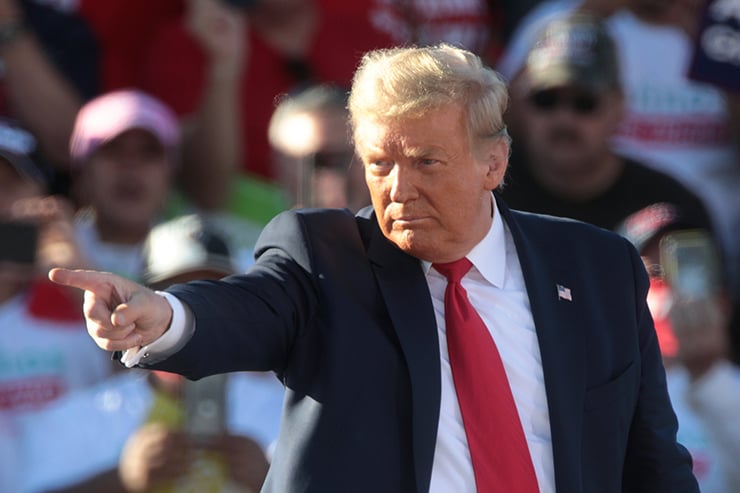Adding to the lasting panic of Democrats over President Biden’s alarming performance in the presidential debate last week, Monday’s Supreme Court decision on presidential immunity sent them and their enablers in the mainstream media into a tailspin of anger and fury.
In a four-minute televised address, after which he characteristically shuffled away from the podium and disappeared behind closed doors without taking questions, Biden solemnly announced his personal “dissent” from the 6-3 ruling, which he called a “dangerous precedent.” “No one, no one is above the law. Not even the president of the United States,” he intoned in a statement that might surprise certain members of the Clinton family, hoodlums who steal up to $900 in merchandise from merchants in blue cities, and possibly even Biden himself if he has the mental capacity to recall boasting in May that the Supreme Court “didn’t stop me” from implementing student debt relief contrary to law as expressed in other high court rulings.
Flippancy aside, the new Supreme Court ruling is quite limited and did not suggest that any president is “above the law.” Rather, the ruling states, “the nature of Presidential power entitles a former President to absolute immunity from criminal prosecution for actions within his conclusive and preclusive constitutional authority. And he is entitled to at least presumptive immunity from prosecution for all his official acts.”
These restrictions are consistent with an internally binding Department of Justice memorandum of 1973, which argues that prosecuting a president is unconstitutional because he “is the symbolic head of the nation” and that “to wound him by a criminal proceeding is to hamstring the operation of the whole governmental apparatus, both in foreign and domestic affairs.” A follow-up memorandum issued by the Justice Department in 2000 upheld that determination. Special counsels Leon Jaworski, Ken Starr, and Robert Mueller all deferred to those directives in their investigations of sitting Presidents Richard Nixon, Bill Clinton, and Donald Trump.
Did this mean those presidents were “above the law?” Far from it. The Justice Department’s reasoning, which stood for the past half century and is now partly enshrined in constitutional law with respect to “official acts,” implicitly recognized that any possible crimes committed by a president while in office could be addressed through the impeachment process in Article I of the Constitution. While prosecution for official acts is now out of bounds, the Supreme Court’s ruling does not alter, void, or prohibit impeachment proceedings. This can still take place through the referral of presidents and other federal officeholders to the Senate for prosecution following a simple majority vote in the House of Representatives. A Senate conviction would result in the president being removed from office and, possibly, a ban on his future officeholding and a referral for criminal prosecution.
Further, impeaching a president or other high official is not time-limited to tenure in office. Trump’s second impeachment and consequent Senate trial happened after he left office in 2021. A similar process occurred in 1876 with impeachment trial of War Secretary William Belknap, who was tried by the Senate after he resigned. There is no reason that impeachment could not unfold in this way for any current or future president, even if he enjoys immunity from prosecution for official acts. Theoretically, Trump himself could be impeached yet again and, if that effort is successful, he would be sanctioned through that action.
The limitation to “official acts” for presidential immunity underscores another element of the Supreme Court’s ruling, which tells us that “there is no immunity for unofficial acts.” A president who commits an alleged crime outside his official capacity is now unequivocally liable to prosecution and very much subject to the law. In Trump’s case, whether the charges against him stem from “official” acts will now be decided by the same federal judge, Tanya Chutkan, who twice ruled against Trump’s motions to have the Washington case against him dismissed on constitutional grounds.
Chutkan—who was appointed by former president Barack Obama and donated to his presidential campaigns, which included Biden on the ticket as the vice presidential candidate—has also made statements that appear to suggest that Trump was responsible for the Jan. 6, 2021, events. She has shockingly refused to recuse herself despite these apparent conflicts of interest. Trump in this case is in no way “above the law,” though he would have the right to appeal a predictable adverse ruling by Chutkan. The process, moreover, will almost certainly delay any trial to after the election.
Make no mistake: The real reason Trump’s critics are so up in arms about the ruling has nothing to do with equality before the law. If it did, Biden would not have taken so much time in his post-ruling national address to lament that his opponent will likely not go to trial again before the election. If this is purely a matter of justice, and not about politics, the timing of the trial would not matter. Trump remains vulnerable to some form of legal jeopardy across the board, as will any future president who commits possible criminal conduct in office.
No president will ever be a “king,” though even kings, in Anglo-American common law practice, have been held personally liable for alleged criminal conduct and, in the case of Charles I of England, tried, convicted, and executed. Trump’s critics are angry because multiple politicized attempts to prevent Trump from holding office have failed and seem likely to continue to fail. In the greatest irony, these attempts may help get the former president reelected.

Leave a Reply